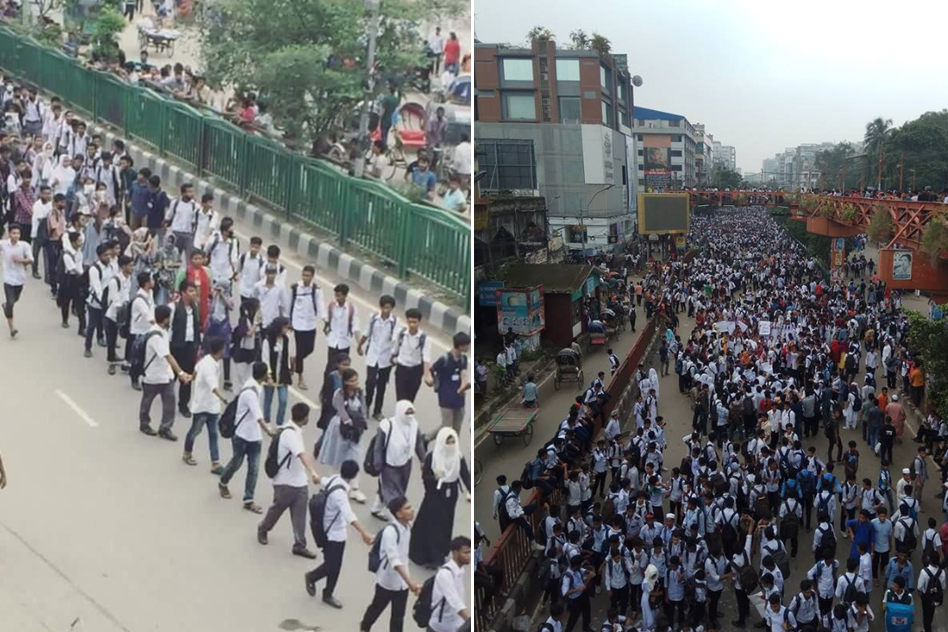
Bangladesh Students' Protest Ends After 9 Days, All You Need To Know
7 Aug 2018 1:08 PM GMT
Editor : Sromona Bhattacharyya
Hailing from Kolkata and now a resident of Bengaluru, Sromona is a multimedia journalist who has a knack for digging stories that truly deserve attention.
For over a week, the capital city of Bangladesh, Dhaka has been burning. What started as a peaceful student protest which aimed at highlighting the issue of road safety in the country has now propelled to become a fight for freedom of speech and against the police crackdown which has resulted in hundreds of injuries so far. After nine days, the protests has finally come to an end, here’s a look at triggered the protests which left over a 100 injured.
What triggered the Bangladesh students’ protests?
With over 4000 road accident-related deaths annually, Bangladesh is one of the world’s worst accident prone countries. So, when two school children- one boy and a girl in Dhaka were run over by a speeding bus, public outrage was at its prime. Reportedly, a Jabal-e-Noor Paribahan bus was responsible for claiming the lives of Dia Khanam Mim and Abdul Karim Rajib – the students, while racing with another bus – a common occurrence in Bangladesh. Md Shahadat Hossain, the owner of the bus, has been arrested since then.
Shipping Minister Shajahan Khan’s remark about the accident and the hypocrisy of the Dhaka students added fuel to the fire. Speaking to media persons, he said, “A road crash has claimed 33 lives in India’s Maharashtra; but do they talk about it the way we do?” Even though he later apologised for the remark he made, Khan’s attempt to normalise road accidents in Dhaka was the final nail in the coffin for thousands of enraged students.
This incident led to social media outrage first and then resulted in waves of mass protests by students mostly between the ages of 13 to 18 in Dhaka. Thousand of students, mostly from schools took to the streets of Dhaka. They blocked all major roads and intersections thereby bringing the whole city of Dhaka to a standstill. Not only that, the students stopped all vehicles and demanded to check driving licences of the drivers. As an attempt to initiate immediate action, the students have reportedly drafted a “Nine-point” demand including capital punishment for irresponsible driving, as reported by bdnews24.
Police crackdown
However, media reports suggested that situations took a turn for the worse after the students vandalised some vehicles. According to BBC, witnesses saw the police crackdown against the protestors where forces used tear gas, batons, and rubber bullets on students who were merely demanding for road safety- right citizens are entitled to.
I try not be political on social media, but I take exception when students and journalists are beaten, raped, and censored by their own government for trying to exercise freedom of speech. The people of Bangladesh need to be heard. #WeDemandJustice pic.twitter.com/H0fRTJUNVN
— Samopi Jerardi (@0liveSundae) August 5, 2018
Not only the police but it has been alleged in several media reports that there have been clashes between the protestors and members of the Bangladesh Chhatra League (BCL), a student body with affiliations with the ruling party in Bangladesh. The government on the same day had even suspended 3G and 4G internet services allegedly to disrupt students from organising themselves using social media platform. College and university students also joined the protests, and on August 6, violence continued as the police forces clashed with college students near university campuses.
May be this pictures seems disturbing to u but trust me the situation is worse than this #WeWantJustice #BangladeshStudentProtests pic.twitter.com/Uo8Pz6GQ3Q
— �� (@parjenrup) August 5, 2018
While scores of students and protesters in Bangladesh have resorted to social media to highlight the instances of police atrocity in the city, many other reports suggest that BCL is also responsible for attacks on journalists who have been trying to report the ongoing protests. Photos shared on Twitter also shows a freelance journalist with his camera being lathicharged and beaten by a group of enraged people. Police arrested photographer and activist Shahidul Alam on August 5 after he made some “provocative comments” in an interview with Al Jazeera.
#Bangladesh: Govt goons and police attacking peaceful protesting students & destroying journalist equipment. Media blackout & internet speeds throttled to 2G to prevent sharing pic/vid & organizing. We MUST #RebootBangladesh pic.twitter.com/AeXxiHB04T
— Mehrab Nitol (@MehrabNitol) August 7, 2018
Government response
While Prime Minister Sheikh Hasina has urged students to stop protesting and go back to their classrooms to study, the government at large seems to be giving in to the demands of the protesting students. According to ANI, the cabinet on August 6 approved the draft of the new Road Transport Act 2018 which was already in the pipeline for some time now. Under the new rules, offenders will be punished with a penalty of five years’ of non-bailable imprisonment. Reportedly, the government will also consider capital punishments for road accidents which are fatal.
Over 317 vehicles have been vandalised, and eight were burned over the past eight days of protest. Since the demands of the students are underway, authorities urge and hope for the anger of the students to refuse to bring back functionality.
The United Nations and even the US Embassy in Dhaka, whose vehicles were vandalised, criticised the police atrocity.
https://twitter.com/UNICEFBD/status/1026080934242578432
 All section
All section













